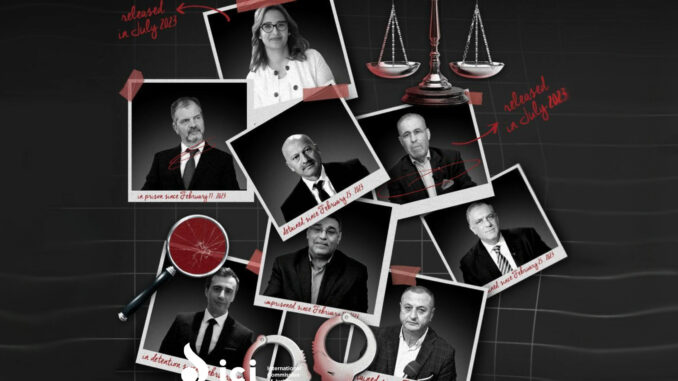
A high-profile trial of around 40 prominent opposition figures began in Tunisia on Tuesday March 3, with lawyers, rights groups, and relatives claiming that the case is politically motivated.
Among the defendants are diplomats, journalists, and politicians who have been vocal critics of President Kaïs Saïed. The accused face serious charges, including “plotting against state security” and “belonging to a terrorist group,” with some potentially facing the death penalty if convicted. Human Rights Watch has condemned the trial, calling it a “mockery” based on “abusive charges,” while the UN has urged Tunisian authorities to end the persecution of political opponents.
The trial has raised concerns over President Saïed’s increasing authoritarian control over the judiciary, which he has strengthened since dissolving parliament in 2021 and ruling by decree. Critics argue that the trial represents part of a broader crackdown on political dissent, with the president’s critics and opponents being targeted through the legal system. As the trial opened, defence lawyers expressed frustration over not being granted full access to the case files, with lawyer Abdelaziz Essid urging the court to end what he described as “madness and absurdity.” The trial involves key opposition figures, including former presidential chief of staff Nadia Akacha, ex-Ennahda leader Abdelhamid Jelassi, and prominent critic Jaouhar Ben Mbarek, some of whom have already fled the country.
The mass trial has sparked widespread outrage, with protests erupting outside the court in Tunis. Activists have voiced their condemnation of what they describe as one of the darkest injustices in the country’s history. The head of the Tunisian League for the Defence of Human Rights, Bassam Trifi, expressed strong opposition to the trial, calling it an assault on justice and freedoms. Demonstrators carried banners reading “No to remote trials, No to a judiciary that does not guarantee rights, freedom for political detainees,” highlighting the growing discontent with Saïed’s administration and its impact on Tunisia’s legal and political systems.
